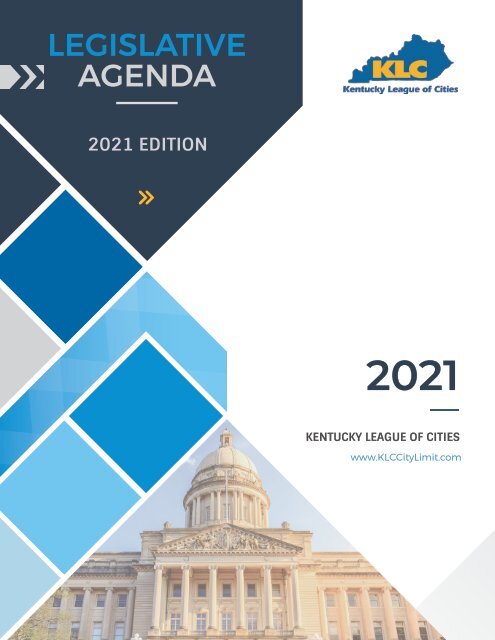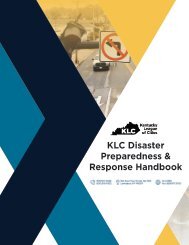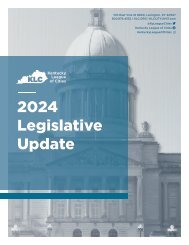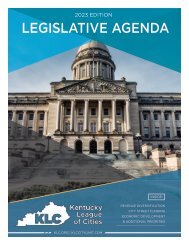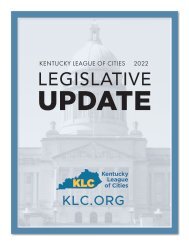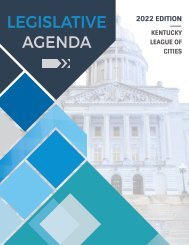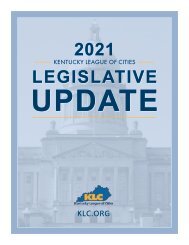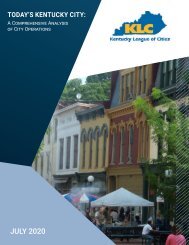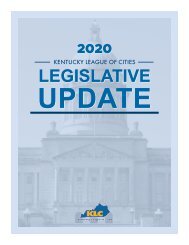KLC 2021 Legislative Agenda
The Kentucky League of Cities serves as the united voice of Kentucky cities. The KLC Board of Directors sets the legislative agenda each year with the goal of ensuring that local elected leaders have the tools and latitude needed to provide effective governance at the local level. Every legislative proposal outlined in the 2021 Legislative Agenda focuses on the growth and vitality of the state through booming and desirable cities.
The Kentucky League of Cities serves as the united voice of Kentucky cities. The KLC Board of Directors sets the legislative agenda each year with the goal of ensuring that local elected leaders have the tools and latitude needed to provide effective governance at the local level. Every legislative proposal outlined in the 2021 Legislative Agenda focuses on the growth and vitality of the state through booming and desirable cities.
Create successful ePaper yourself
Turn your PDF publications into a flip-book with our unique Google optimized e-Paper software.
LEGISLATIVE<br />
AGENDA<br />
<strong>2021</strong> EDITION<br />
<strong>2021</strong><br />
KENTUCKY LEAGUE OF CITIES<br />
www.<strong>KLC</strong>CityLimit.com
<strong>KLC</strong> Advocates for Cities<br />
<strong>KLC</strong> <strong>Legislative</strong> <strong>Agenda</strong> <strong>2021</strong><br />
www.<strong>KLC</strong>CityLimit.com<br />
What is the Kentucky League of Cities?<br />
Established in 1927, the Kentucky League of Cities serves as the united voice of Kentucky<br />
cities. Committed to the principle of home rule, <strong>KLC</strong> believes local decisions are best made<br />
at the local level. We are governed by a 65-member Board of Directors and a 17-member<br />
Executive Board.<br />
Who Does <strong>KLC</strong> Serve?<br />
The Kentucky League of Cities represents mayors, city managers and administrators, fire<br />
chiefs, police chiefs, city attorneys, city clerks, council members, commissioners and<br />
many more city officials.<br />
<strong>KLC</strong> LEGISLATIVE ADVOCACY EFFORTS:<br />
*<br />
*<br />
*<br />
*<br />
*<br />
*<br />
Local, State and Federal Relations<br />
<strong>Legislative</strong> Testimony on Issues<br />
Important to Cities<br />
Annual <strong>Legislative</strong> <strong>Agenda</strong> for Cities<br />
Annual <strong>Legislative</strong> Update for Cities<br />
<strong>Legislative</strong> Wrap-Ups for Cities<br />
Awards and Recognition of Legislators<br />
Who Go Above and Beyond for Cities<br />
OTHER SERVICES PROVIDED BY <strong>KLC</strong>:<br />
*<br />
*<br />
*<br />
*<br />
Community Development<br />
Financial Services<br />
Municipal Law<br />
Education & Training<br />
*<br />
*<br />
*<br />
*<br />
*<br />
*<br />
*<br />
*<br />
*<br />
*<br />
*<br />
<strong>KLC</strong> City Limit <strong>Legislative</strong> News Website<br />
Weekly <strong>Legislative</strong> Bulletin<br />
Bill Drafting and Tracking During<br />
Session<br />
Research<br />
Local Mandate Analysis<br />
Wage and Salary Survey/Report<br />
City Government Month<br />
Insurance<br />
Personnel Services<br />
Kentucky City Magazine<br />
<strong>KLC</strong> Conference & Expo<br />
2
Why Kentucky Cities Matter<br />
<strong>KLC</strong> <strong>Legislative</strong> <strong>Agenda</strong> <strong>2021</strong><br />
www.<strong>KLC</strong>CityLimit.com<br />
Cities Are Booming<br />
• Cities are responsible for 75% of all economic activity in the commonwealth.<br />
• City populations have grown four times faster than unincorporated areas in Kentucky<br />
since 2010.<br />
• City populations have grown by 4% since 2010, compared to 1.2% for unincorporated<br />
areas.<br />
• 2.47 million people live in Kentucky cities.<br />
• Four out of five jobs in Kentucky are in cities.<br />
• Kentucky cities employ more than 30,500 people.<br />
• City governments spend more than $5.5 billion each year.<br />
• Cities are responsible for more than 10,000 miles of public roads in Kentucky.<br />
• About 40% of Kentucky cities operate a public drinking water utility, 45% operate a<br />
municipal sewer system, and 17% operate either an electrical or natural gas system.<br />
Cities Provide Essential Services<br />
• Public Safety<br />
• Sidewalks and Street Lights<br />
• Clean Drinking Water<br />
• Sewer Systems and Wastewater Treatment<br />
• Economic Development<br />
• Safe Roads<br />
• Public Transportation and Bike Paths<br />
• Tourism and Recreation<br />
• Code Enforcement<br />
• Parks and Public Spaces<br />
• Public Utilities<br />
• Youth and Senior Services<br />
• Trash and Recycling Collection<br />
• Historic Preservation<br />
• Job Training<br />
• Public Housing<br />
3
The <strong>Legislative</strong> <strong>Agenda</strong><br />
<strong>KLC</strong> <strong>Legislative</strong> <strong>Agenda</strong> <strong>2021</strong><br />
www.<strong>KLC</strong>CityLimit.com<br />
The <strong>KLC</strong> Board of Directors sets the legislative agenda each year after extensive discussion<br />
and consultation with local elected officials and public service representatives in cities of<br />
all sizes. The goal is to ensure that community leaders have the tools and latitude needed<br />
to provide effective governance at the local level.<br />
City representatives establish top legislative priorities each session. For <strong>2021</strong>, the call<br />
is for modernization of transportation funding and revenue options. The need for new<br />
approaches to economic development, policing and community revitalization are also high<br />
on the <strong>2021</strong> <strong>Legislative</strong> <strong>Agenda</strong>. Every proposal focuses on the growth and vitality of the<br />
state through booming and desirable communities.<br />
The Kentucky League of Cities and all its members seek to enhance the quality of life<br />
within our cities. The <strong>KLC</strong> <strong>Legislative</strong> <strong>Agenda</strong> aims to provide local elected leaders with the<br />
mechanisms needed to develop and maintain thriving municipalities for Kentucky while<br />
preserving the tenets of home rule.<br />
FOR MORE INFO<br />
Contact the <strong>KLC</strong> <strong>Legislative</strong> Team.<br />
J. D. Chaney Bryanna L. Carroll<br />
Executive Director/<br />
CEO<br />
jchaney@klc.org<br />
Director of Public Affairs<br />
bcarroll@klc.org<br />
1-800-876-4552<br />
4
Road Funding<br />
<strong>KLC</strong> <strong>Legislative</strong> <strong>Agenda</strong> <strong>2021</strong><br />
www.<strong>KLC</strong>CityLimit.com<br />
Kentucky cities are booming! More people moving into Kentucky’s thriving cities and more<br />
jobs being added to the local economy mean more traffic. Kentucky cities are responsible<br />
for thousands of miles of public roads, but it is not an easy or inexpensive task. As state<br />
and federal funding dwindles, municipalities are forced to do more with less, and the<br />
high cost of maintaining vital infrastructure becomes more of a struggle. It is time for the<br />
Kentucky legislature to pass measures that address the growing transportation needs in<br />
the state and modernize the antiquated funding formulas that no longer fairly distribute<br />
gas tax proceeds to local governments.<br />
<strong>Legislative</strong> Priority: Cities seek legislation that reprioritizes the state’s investment in<br />
transportation, ensures adequate revenue for transportation projects, and updates the<br />
road funding formula to more accurately reflect the way Kentuckians live and travel in the<br />
21st century.<br />
The condition of city roads and bridges directly impacts the ability of a community to grow<br />
and attract new business. While the population of Kentucky cities has continued to expand,<br />
the funding formulas of important transportation networks have not changed for nearly 50<br />
years.<br />
Additionally, Kentucky has not updated the amount it collects at the gas pump since 2015.<br />
Twenty-three (23) states and the District of Columbia have amended their gas tax since<br />
that time, including nearby Indiana, Ohio, Tennessee, Illinois, Virginia and West Virginia.<br />
However, Kentucky has remained the same and collected relatively flat revenues.<br />
23 States with Updated Gas Tax:<br />
Alabama, Arkansas, California, Georgia,<br />
Idaho, Illinois, Indiana, Iowa, Michigan,<br />
Montana, Nebraska, New Jersey, North<br />
Carolina, Ohio, Oklahoma, Oregon, South<br />
Carolina, South Dakota, Tennessee,<br />
Utah, Virginia, Washington and West<br />
Virginia.<br />
5
Road Funding<br />
<strong>KLC</strong> <strong>Legislative</strong> <strong>Agenda</strong> <strong>2021</strong><br />
www.<strong>KLC</strong>CityLimit.com<br />
Kentucky brought in $31.6 million less in motor fuels taxes in FY 2020 compared to FY<br />
2019 ‒ 16% less than the high mark seen in FY 2014. Motor fuels revenue is expected to<br />
stay flat for the next several years, well below the FY 2014 $886 million level.<br />
Motor fuels taxes are the only portion of<br />
the Road Fund that is shared with local<br />
governments, with 48.2% divided among<br />
city, county, and rural roads largely through<br />
a system established in 1948. Known as the<br />
“formula of fifths,” the system allocates<br />
40.5% of fuels tax revenue to county and<br />
secondary roads. The formula heavily favors<br />
rural areas: One-fifth is allocated equally to<br />
all counties, one-fifth is based on rural<br />
population, one-fifth is based on rural road<br />
miles and the remaining two-fifths is divvied<br />
up according to rural land area. The formula<br />
does not factor in the population boom of<br />
cities nor the high cost of upkeep for those<br />
heavily traveled roads. In fact, it can<br />
penalize counties with rapid growth.<br />
Gas Tax Revenue from 2014 to 2020<br />
Kentucky brought in $31.6 million less in motor<br />
fuels taxes in FY 2020 compared to FY 2019.<br />
Levels have not reached those seen in FY 2014.<br />
Cities maintain more than 10,000 miles of public roads ‒ streets that are more expensive<br />
to build and preserve due to requirements such as curbs and gutters, Americans with<br />
Disabilities Act (ADA) required sidewalks, and storm water drainage. Cities have seen<br />
spending on streets and roads climb 36% from FY 2010 to FY 2019, while state and federal<br />
support has dropped nearly 24%.<br />
The legislature created the municipal road aid program in 1972 ‒ which allocates 7.7%<br />
of fuels tax revenue ‒ but it has also not changed since that time. State and federal<br />
road funds currently provide only about one-fourth of what cities spend on streets. The<br />
bulk of the cost is borne by local taxpayers at the expense of other important programs<br />
and services that receive revenue through local city tax dollars.<br />
6
Road Funding<br />
<strong>KLC</strong> <strong>Legislative</strong> <strong>Agenda</strong> <strong>2021</strong><br />
www.<strong>KLC</strong>CityLimit.com<br />
It Is Time to Modernize<br />
An agreement reached between the Kentucky<br />
League of Cities and Kentucky Association<br />
of Counties (KACo) to update the state’s road<br />
funding formula acknowledges the growth and<br />
demand on city streets by equally dividing<br />
shareable motor fuels income over $825<br />
million, the high reached in FY 2014. Any<br />
amount above that threshold would be split<br />
between the municipal and county road aid<br />
programs at 13% each. This will help ensure<br />
cities have the resources needed to keep hightraffic<br />
areas safe while also holding counties<br />
harmless.<br />
Road Aid Formula Modernization<br />
Currently, 61% of yearly local vehicle miles<br />
traveled in Kentucky are on rural roads, yet<br />
county and rural secondary roads receive 85%<br />
of road aid revenue. Urban roads account for<br />
39% of local vehicle miles traveled, but cities<br />
are only provided 15% of the state’s road aid<br />
allocations. The Federal Highway Administration<br />
(FHWA) reports that vehicle usage since 2010<br />
has decreased 10% on rural local roads in the<br />
state but increased 10% on urban local roads.<br />
The Kentucky League of Cities is part of the Kentucky Infrastructure Coalition (KIC), a group<br />
of more than 43 organizations and employers that is calling for the legislature to act.<br />
Infrastructure needs have never been higher, and time is running out. If the state does not<br />
take action in the <strong>2021</strong> session, Kentucky will lag another year behind and bridges and<br />
roads will continue to deteriorate. It is time to modernize and enact measures that bring<br />
Kentucky in line with neighboring states.<br />
7
Revenue Diversification<br />
<strong>KLC</strong> <strong>Legislative</strong> <strong>Agenda</strong> <strong>2021</strong><br />
www.<strong>KLC</strong>CityLimit.com<br />
Cities are the foundation on which Kentucky is built. Most Kentuckians work and live in a city,<br />
and cities provide the infrastructure that keeps Kentucky running. People migrating to Kentucky’s<br />
cities are looking for a quality of life that requires resources to keep people safe, connected and<br />
productive. It is vital that the local elected officials entrusted with maintaining their city have the<br />
ability to generate the revenue needed to meet the community’s needs while also recognizing the<br />
unique opportunities and challenges that each city faces.<br />
<strong>Legislative</strong> priority: Kentucky’s revenue-limited cities seek modernization of the state’s antiquated<br />
funding options, equalization of revenue tools that are currently only available to some cities<br />
based on prior classification, and protection of the few methods available to cities to pay for<br />
services and community enhancements.<br />
Unlock Kentucky’s Potential<br />
Kentucky cities have been forced to rely on a small number of revenue options for 130 years.<br />
The Kentucky Constitution, adopted in 1891, impedes the legislature’s ability to comprehensively<br />
reform local government tax policies. That means city leaders must run growing communities and<br />
fund an increased demand for services on revenue that is largely generated from productivity ‒<br />
income collected through property, occupational, and license taxes, and from a few fees.<br />
Revising the language in Section 181 of the Kentucky Constitution is the first step in designing<br />
revenue options more in line with the 21st century economy, so legislators can enact measures<br />
that allow for more decisions at the local level. Once the legislature passes a bill seeking a change<br />
to that one section of the constitution, Kentuckians would vote on the idea in the 2022 election.<br />
Recognizing the need to modernize such antiquated language is key to unlocking Kentucky’s<br />
potential.<br />
Current funding limitations and the financial strains created by the unprecedented impact of 2020<br />
have threatened the potential for economic development in several Kentucky cities. While many<br />
cities have been able to cut budgets and trim staff, local elected leaders can do only so much<br />
while costs continue to climb. City leaders can either add to existing taxes paid by their citizens or<br />
reduce services that are needed to attract new businesses and jobs.<br />
8
Revenue Diversification<br />
<strong>KLC</strong> <strong>Legislative</strong> <strong>Agenda</strong> <strong>2021</strong><br />
www.<strong>KLC</strong>CityLimit.com<br />
One option available to some municipalities is the collection of consumption-based restaurant<br />
revenue. This is income generated more from visitors to the community and helps fund<br />
neighborhood improvements. However, only former fourth and fifth class cities can collect the<br />
earnings, which preempts almost half of the state’s cities from even considering this financial<br />
option.<br />
Consumption-Based Revenue<br />
Consumption-based restaurant revenue is collected from consumers who choose to eat in a<br />
local establishment. This allows for tourists and other visitors to a city to help fund the services<br />
and amenities they utilize. Spreading out the cost to everyone ensures local citizens are not<br />
shouldering the entire expense of operating and maintaining a city, and it reduces taxes on the<br />
restaurant owner.<br />
Business owners who collect a small<br />
1%, 2% or 3% fee on a customer’s bill<br />
would not pay a net profits or gross<br />
receipts tax. A portion of the funds would<br />
go to the local tourism commission, and<br />
the city would utilize the rest to invest<br />
in community improvements that are<br />
designed to draw more tourists and<br />
restaurant customers into the city.<br />
City Tax Revenue Sources FY 2019<br />
When it comes to collecting<br />
consumption-based restaurant revenue<br />
and other needed types of reform, the<br />
focus is often on leveling the playing<br />
field. Many Kentucky cities border<br />
Tennessee, which has no state income tax.<br />
Competing for business and jobs in these<br />
communities is a challenge.<br />
9
Revenue Diversification<br />
<strong>KLC</strong> <strong>Legislative</strong> <strong>Agenda</strong> <strong>2021</strong><br />
www.<strong>KLC</strong>CityLimit.com<br />
Moving Kentucky into a more consumption-based tax structure would be a big step toward<br />
modernization. That includes allowing cities the option to collect a local sales tax. Kentucky is one<br />
of only 12 states that does not allow one or more local governments to collect that funding.<br />
Some cities and/or counties have<br />
sales tax authority (38 states).<br />
No cities and/or counties have<br />
sales tax authority (8 states).<br />
No state or local sales tax (4 states).<br />
It is important that changes to tax policies<br />
do not obstruct the few revenue-generating<br />
options cities have available. Both cities and<br />
counties can collect an occupational license tax<br />
on the net profits of businesses and/or on the<br />
salaries and wages that employees earn. The<br />
money raised provides the essential services<br />
business owners and their employees expect<br />
while doing business in the community. If a<br />
city and county with a population of 30,000 or<br />
more both levy an occupational license tax, the<br />
amount paid to the city can be credited toward<br />
the amount owed to the county, except in a few<br />
circumstances.<br />
The credit helps ensure taxes are not stacked on local businesses and workers. People who<br />
conduct business in a city’s limits count on city services (police, fire, streets, etc.). Removing<br />
the crediting provision would ultimately result in taxpayers paying for duplicate services.<br />
Eliminating the credit would result in millions of dollars of higher taxes for more than a quarter<br />
million Kentuckians.<br />
State government should not interfere with the collection of local funds that pay for community<br />
services. Centralized collection of municipal revenue would slow down the ability of city leaders<br />
to serve their citizens. Additionally, it could create an environment where money designated for<br />
local projects ends up swept into state coffers.<br />
Mayors and other local elected officials are calling on state legislators to support the principles<br />
of home rule and provide the tools cities need to keep the state on a path of progress and<br />
prosperity. Revenue diversification is a big part of the equation. By allowing cities to pursue<br />
economic solutions that are specific to their community’s unique challenges, Kentucky will be<br />
embracing modern funding solutions that help ensure the state continues to thrive.<br />
10
Economic Development<br />
<strong>KLC</strong> <strong>Legislative</strong> <strong>Agenda</strong> <strong>2021</strong><br />
www.<strong>KLC</strong>CityLimit.com<br />
Cities are the economic engines of Kentucky. Most people work in a city, and when<br />
companies consider locating in Kentucky it is the amenities, workforce and livability of<br />
nearby cities that factor heavily into the decision. Economic development is vital to the<br />
future of Kentucky and its thriving cities.<br />
<strong>Legislative</strong> Priority: The Kentucky League of Cities Board of Directors supports legislation in<br />
the <strong>2021</strong> Regular Session of the General Assembly that enhances economic development<br />
opportunities in Kentucky’s cities.<br />
Several programs aim to help communities recruit new jobs and expand the available<br />
workforce, but these initiatives often need to be updated and modified to ensure they<br />
provide the intended boost. For instance, the current cap on Kentucky’s historic tax credit<br />
limits its use.<br />
<strong>KLC</strong> seeks to increase the $5 million cap to $30 million a year to make it more feasible for<br />
private investors to help cities restore historic buildings. Such a change would revitalize<br />
communities, create jobs and improve property values.<br />
Many of Kentucky’s neighboring states uncapped their Historic Tax Credit and have seen<br />
more investments and jobs. Kentucky legislators enhanced the tax credit for one year in<br />
2014 for Louisville and Lexington, and the onetime increase resulted in more than $300<br />
million in investments and 1,700 new jobs.<br />
As Kentucky attempts to reconstruct the state’s economy and recover from the impact of<br />
the COVID-19 pandemic, every opportunity must be explored. Cumbersome and outdated<br />
restrictions on economic development incentives make such programs less likely to be<br />
utilized. Additionally, city leaders are looking for new ideas to grow their community and<br />
Kentucky overall.<br />
11
Blighted, Deteriorated & Vacant Properties<br />
Communities of all sizes are dealing with a growing dilemma ‒ blighted and abandoned<br />
properties. From homes to businesses and former industrial sites, these areas are often<br />
more than a nuisance. They can attract crime, bring down property values and create a fire<br />
hazard. Determining how to approach the problem and finding the best way to rehabilitate<br />
these locations are ongoing struggles.<br />
<strong>Legislative</strong> Priority: Expand the tools currently available to cities to address deteriorated and<br />
vacant properties, including creating a conservatorship for rehabilitation of qualifying areas.<br />
Most cities in Kentucky have faced the question of how to handle rundown and empty<br />
buildings. A study conducted by the Lincoln Institute of Land Policy revealed that unused<br />
homes and businesses can cost a city millions of dollars in lost tax revenue and lead to a<br />
feeling of community isolation for citizens who live near the site.<br />
A 2019 <strong>KLC</strong> survey found that almost all Kentucky cities have some type of vacant or blighted<br />
property and most have taken local action within the past two years to address the issue.<br />
However, the concern grows as a city grows. The few options cities have to help with these<br />
areas are not often feasible for municipalities with a population below 1,000, which is a<br />
majority of Kentucky cities.<br />
The ability to create a conservatorship for deteriorated properties gives cities a new way<br />
to seek a solution that ensures the financial and aesthetic value of the community. Rules<br />
would be set to help the court determine if a location is “abandoned and blighted.” A local<br />
government would have to file a petition with the Circuit Court in the county in which the<br />
structure is located for appointment of a conservator to take possession of and fix the<br />
property. Additionally, the petition would be required to include copies of all code violations,<br />
a preliminary plan for rehabilitation to bring the building into compliance, cost estimates,<br />
anticipated funding sources, and a timeline for completion.<br />
Certain locations would be ineligible for conservatorship, and the entire process would<br />
include repeated updates to all interested parties. Twenty-two (22) states have implemented<br />
similar legislation, including six of Kentucky’s seven contiguous states.<br />
Rehabilitation of abandoned and blighted buildings benefits a community by providing<br />
for productive reuse, reinstatement of taxable property, and increased property values, in<br />
addition to the promotion of affordable housing.<br />
12
ADDITIONAL PRIORITIES<br />
Modernization of Newspaper Publication Requirements:<br />
Kentucky cities constantly review budgets and expenses to ensure they<br />
are good stewards of taxpayer dollars. Legislators passed House Bill 195<br />
in the 2020 session to help some local governments conserve resources,<br />
but the legislation only pertains to 145 cities in nine counties.<br />
The bill allows local governments within a county that has a population of 80,000 or more<br />
to post documents and other legal announcements on their website instead of paying to<br />
print the entire notice in a local newspaper. There are rules for how and where the document<br />
must be available online, and a city must still publish a onetime newspaper advertisement to<br />
inform citizens on where the information is located.<br />
<strong>Legislative</strong> Priority: Cities seek legislation in the <strong>2021</strong> session to modernize publication laws<br />
for all municipalities by permitting cities, regardless of a county’s population, to publish<br />
documents and advertisements on a city website in lieu of full newspaper publication.<br />
Policing Procedures:<br />
Recent high-profile incidents have raised awareness of the need to<br />
review policing procedures utilized by public safety officers who are<br />
tasked everyday with keeping our communities safe.<br />
Developing better, more united cities requires a dedicated police force that has the training<br />
and guidance needed to ensure that they are able to do their job. <strong>KLC</strong> and its member cities<br />
support the police departments that keep our cities safe and recognize the need to ensure<br />
citizens that officers are meeting the high expectations set by the community and its elected<br />
officials.<br />
<strong>Legislative</strong> Priority: City leaders seek legislation that strengthens the decertification law that<br />
ensures officers who get in trouble or are under investigation do not simply change jobs to<br />
another department. Cities also support limiting the use of no-knock warrants. <strong>KLC</strong> opposes<br />
both eliminating qualified immunity and passing other limitations that hinder the ability of a<br />
peace officer to conduct his or her job safely and effectively.<br />
13
ADDITIONAL PRIORITIES<br />
Open Records/Open Meetings Law:<br />
Transparency is vital to ensure citizens have faith in the management<br />
of their city and utilization of tax revenue. However, it is important that<br />
efforts to improve and ensure open government are not detrimental to<br />
it running a cost-efficient operation. Senate Bill 230, passed in the 2019<br />
Regular Session, provides citizens the ability to email a request for documents subject to the<br />
Open Records Act. The measure created some unforeseen issues for city clerks.<br />
<strong>Legislative</strong> Priority: <strong>KLC</strong> seeks an amendment to Kentucky’s Open Records Act to make<br />
compliance easier for cities, particularly in response to electronic submission of requests.<br />
Cities are also seeking an amendment to Kentucky’s Open Meetings Act to allow going into<br />
closed session to authorize an agent to bid at an auction on the sale of property and to<br />
discuss contract negotiations.<br />
Substance Abuse:<br />
Since 2013, the Kentucky League of Cities has maintained an active<br />
position on battling the substance abuse epidemic throughout the<br />
commonwealth. It remains a top legislative priority for <strong>2021</strong>. All cities in<br />
the state are impacted by the social, criminal and economic impacts of<br />
alcohol and drug abuse.<br />
<strong>Legislative</strong> Priority: <strong>KLC</strong> will continue to support legislation that addresses the substance<br />
abuse problem in Kentucky. The League will have an active position on and participate in<br />
efforts to combat the criminal aspects of drug trafficking and abuse as well as a proactive<br />
stance on treatment, rehabilitation, training and workforce reentry for those who suffer from<br />
alcohol and drug abuse. Additionally, <strong>KLC</strong> will support the Office of Drug Control Policy<br />
working with local governments to establish criteria for a city to be designated a Recovery<br />
Ready Community for treatment and rehabilitation.<br />
14
ADDITIONAL PRIORITIES<br />
Alcohol Regulatory License Equity:<br />
Cities continue to see a disparity in the number and types of alcohol<br />
licenses that can be issued at the state level compared to those issued<br />
by city governments. This makes regulating licenses at the local level<br />
more difficult, if not impossible. Senate Bill 29, passed in the 2019<br />
Regular Session, helped level the playing field by allowing some cities to impose a regulatory<br />
license fee upon the gross receipts of the sale of alcoholic beverages. However, it only applied<br />
to cities with a population of less than 20,000, and some language in the measure created an<br />
issue for cities that had a local-option election between July 15, 2014, and July 15, 2017.<br />
<strong>Legislative</strong> Priority: <strong>KLC</strong> supports expanding to all cities the ability to collect an alcohol<br />
regulatory license fee to offset some of the community’s additional policing and regulatory<br />
costs associated with alcohol sales. Cities also support modifying the two-year enactment<br />
requirement from a wet or moist election date.<br />
Paramedic and EMT Training:<br />
Local governments are finding it more and more difficult to acquire<br />
qualified and certified candidates for paramedics and emergency<br />
medical technicians (EMTs). The current method used by the Kentucky<br />
Board of Emergency Medical Services (KBEMS) makes certification<br />
difficult to obtain, which can delay the hiring and training process for cities in need of medical<br />
first responders.<br />
<strong>Legislative</strong> Priority: Change the way KBEMS certifies paramedics and EMTs to make it easier<br />
for cities to find qualified and certified candidates and clarify that the current gubernatorial<br />
appointee to KBEMS who represents cities comes form a list of candidates submitted to the<br />
governor by the Kentucky League of Cities.<br />
Local Government Bonding and Investments:<br />
Legislators passed House Bill 69 in the 2019 session to provide local<br />
governments more opportunities to earn improved rates of return on<br />
investments. However, more adjustment needs to be made to ensure<br />
cities are maximizing benefits for taxpayers.<br />
<strong>Legislative</strong> Priority: Cities seek an amendment that allows an unlimited percentage of<br />
investments to go into mutual funds solely comprised of instruments that are not otherwise<br />
limited.
ADDITIONAL PRIORITIES<br />
Rehiring Retired Police Officers and Firefighters:<br />
Public safety is one of the key responsibilities for city leaders. City police<br />
and fire departments rely on skilled public servants to keep residents<br />
safe. The ability of these public safety agencies to rehire retired officers<br />
and firefighters is key to ensuring the city has adequate staffing and that<br />
those emergency responders are armed with enough experience and<br />
expertise to handle any situation.<br />
<strong>Legislative</strong> Priority: City leaders ask legislators to change the reference year in current statute<br />
that limits the number of rehired police officers a city may employ. Municipalities would also<br />
like to pursue a similar program for fire departments.<br />
Police and Fire Personnel:<br />
City police and fire departments often require a staff that is as diverse<br />
as the roles they fill. These positions perform a wide range of services,<br />
but they do not all share the same risk or expertise. Some of the roles<br />
are appointed by local elected leaders, some serve despite a risk to their<br />
own health and safety, while others function in a support roll within the<br />
department.<br />
<strong>Legislative</strong> Priority: <strong>KLC</strong> will pursue clarification to existing policies to stress that chiefs and<br />
non-uniformed employees are not entitled to a hearing process similar to those afforded<br />
to uniformed emergency responders who interact on a regular basis with the public.<br />
Additionally, clarity is sought on the complaint process utilized for public safety officers,<br />
and on vacation leave afforded to support staff to provide for a different system than that<br />
which is provided to uniformed officers. Cities are also seeking a clear process for the<br />
potential reduction of force and the elimination of the age restriction for the hiring of certain<br />
firefighters.<br />
16
ADDITIONAL PRIORITIES<br />
Property Tax Notification and Rate Setting:<br />
Collecting property taxes in many local communities can sometimes be<br />
a time-consuming and burdensome task. Current procedure does not<br />
ensure municipalities have the most accurate ownership information<br />
when tax bills are mailed to citizens. This can cause unneeded delays in<br />
revenue collection and create unnecessary confusion for property owners.<br />
<strong>Legislative</strong> Priority: Municipalities ask the legislature to require property valuation<br />
administrators (PVAs) to send cities updated ownership information instead of just providing<br />
city clerks a list of property owners as of January 1. This will ensure any property transfers<br />
that have occurred after that date are accurately reflected in tax bills that are mailed to<br />
citizens. Cities also support streamlining the process for cities that need to propose a property<br />
tax rate that would produce more than 4% above the compensating rate increase currently<br />
allowed.<br />
Training for Elected City Officials:<br />
Local elected officials are often members of the community who<br />
wish to serve the public. They may take office without a knowledge of<br />
parliamentary procedure, budgeting, local laws or state requirements.<br />
<strong>Legislative</strong> Priority: Veteran city officials urge the legislature to mandate a three-hour, no-cost<br />
training course for newly elected city officials that will ensure a rudimentary knowledge of the<br />
duties and obligations of local elected officials.<br />
Liability Protections:<br />
The forced economic shutdown that resulted from the COVID-19<br />
pandemic hit many local government budgets, and the potential for<br />
coronavirus-related lawsuits further threatens taxpayer resources.<br />
While the federal government needs to address liability protections, it is<br />
imperative that the state provide such protections as well.<br />
<strong>Legislative</strong> Priority: <strong>KLC</strong> will advocate for liability protections to safeguard taxpayer resources<br />
from frivolous COVID-related lawsuits.
ADDITIONAL PRIORITIES<br />
Wholesale Water Rates:<br />
Wholesale water rates are regulated by the Kentucky Public Service<br />
Commission (PSC). Proposed rate increases between municipal and<br />
regulated utilities can be appealed to the PSC, but municipal utilities<br />
may lose those potential proceeds during the appeal process, even if the<br />
increase is later approved.<br />
<strong>Legislative</strong> Priority: Cities seek to amend state law to provide that during a period of appeal to<br />
the PSC for a new wholesale rate in transactions between municipal utilities and regulated<br />
utilities, the proposed rate increase is escrowed rather than lost by the municipal utility.<br />
Untrained Constables:<br />
Untrained constables pose a threat to the safety and security of cities.<br />
Several incidents have already been documented of these elected<br />
officers abusing their power and putting citizens in danger. In 2012, a<br />
committee created by the Kentucky Justice and Public Safety Cabinet<br />
recommended lawmakers review powers granted to constables<br />
under the Kentucky Constitution to either eliminate or restrict the position or to grant local<br />
governments the ability to set limitations on constables.<br />
<strong>Legislative</strong> Priority: <strong>KLC</strong> supports legislation to amend state law to eliminate the peace officer<br />
powers of constables unless they are certified by the Kentucky Law Enforcement Council and<br />
approved by the county fiscal court.<br />
Annexation Filings with the Secretary of State:<br />
Many Kentucky cities are growing, adding to the population and city<br />
boundaries. When a city annexes nearby property, it is required to file a<br />
new map with the Secretary of State to ensure the state’s database has<br />
the newest data.<br />
<strong>Legislative</strong> Priority: Municipalities seek legislation to require annexation submissions to<br />
include an electronic map to expedite entry of the new boundaries into the secretary’s land<br />
database.
ADDITIONAL PRIORITIES<br />
Splash Parks/Pads:<br />
Splash parks are growing in popularity as they offer cities a less<br />
expensive way to provide families more opportunities to enjoy the<br />
summer. These public areas have some ambiguity under current<br />
Kentucky law.<br />
<strong>Legislative</strong> Priority: Cities are advocating for legislation that determines what laws and<br />
regulations apply to splash parks/pads compared to swimming pools.<br />
Firefighter Candidate Physical Agility Testing:<br />
The process of hiring and training new firefighters can be arduous.<br />
Potential delays in Candidate Physical Agility Testing (CPAT) provided by<br />
the Kentucky Fire Commission, which is only available twice a year in<br />
limited locations, complicate the process.<br />
<strong>Legislative</strong> Priority: Providing cities the opportunity to develop their own physical agility<br />
testing, if they so choose, could provide a quicker path toward staffing fire departments.<br />
Efficient Streetlights:<br />
Streetlights can be a costly expenditure for cities, but they are a<br />
necessity for public safety. The quality and cost of those lights often can<br />
be improved greatly with the use of light emitting diodes (LEDs) or other<br />
more efficient options.<br />
<strong>Legislative</strong> Priority: <strong>KLC</strong> will advocate for legislation that permits city governments to use<br />
eminent domain or otherwise require electric utilities to use more efficient lighting options<br />
for streetlights.<br />
19
ADDITIONAL PRIORITIES<br />
Peace Officer Work Schedules:<br />
Peace officers do not always work a set schedule, and a community’s<br />
needs can often cause their work hours to change. Cities and their police<br />
officers need flexibility to amend the standard work schedule for officers<br />
to ensure taxpayer resources are being best utilized while also providing<br />
for the safety of the neighborhood.<br />
<strong>Legislative</strong> Priority: Cities seek to amend current law to allow home rule cities to adopt a 14-<br />
day work period of up to 80 hours, instead of 40 hours within a seven-day work period. The<br />
change will allow for a better work-life balance for officers while reducing overtime paid by a<br />
municipality.<br />
Employees Carrying Weapons:<br />
Private employers in Kentucky can prohibit their employees from<br />
carrying a weapon on the business’ property or while on duty. Public<br />
employers cannot.<br />
<strong>Legislative</strong> Priority: <strong>KLC</strong> will advocate to amend state law so cities could have the same option<br />
private employers have to prohibit an employee from carrying weapons during his or her<br />
official duties.<br />
Transportation Improvement Districts:<br />
Infrastructure is a growing need in every community. These projects<br />
often require innovative approaches to solve evolving needs and to<br />
acquire adequate funding.<br />
<strong>Legislative</strong> Priority: Cities will explore the possibility of creating Transportation Improvement<br />
Districts to find new and alternative funding sources for the implementation of transportation<br />
projects within a defined geographic area.<br />
20
ADDITIONAL PRIORITIES<br />
Joint/Regional Tourism Commissions:<br />
Tourism commissions ensure local events and destinations are<br />
highlighted throughout the region and state. These commissions often<br />
encompass several communities and are a joint effort among local<br />
governments and industry representatives. It is important that every<br />
agency impacted by the commission’s decisions has a seat at the table.<br />
<strong>Legislative</strong> Priority: A tourism commission that covers two or more counties should be<br />
required to provide representation for the mayor of the largest city in each county that<br />
participates in the commission, or a designee of the mayor’s choosing. Representation<br />
should also be required for suburban cities on a tourism commission in a consolidated local<br />
government.<br />
Ambulance Service Certificate of Need:<br />
While many local governments operate an ambulance as part of the<br />
community’s emergency medical services, others find it is more prudent<br />
to contract with a private ambulance company. However, those cities and<br />
counties need to be able to begin operations if the private company is<br />
not responding to the community’s needs in a timely and judicious manner.<br />
<strong>Legislative</strong> Priority: Municipalities seek solutions for local governments that need to obtain a<br />
certificate of need from the Kentucky Cabinet for Health and Family Services when a private<br />
ambulance company is not providing the necessary level of services.<br />
21
ADDITIONAL PRIORITIES<br />
Planned-Unit/Homeowner Association:<br />
Neighborhood associations can often improve the quality of life in a<br />
city, providing amenities and creating a sense of community. However,<br />
in some cases the association cannot continue to afford the services it<br />
was designed to provide, leading to concern about how neighborhood<br />
programs will be funded.<br />
<strong>Legislative</strong> Priority: <strong>KLC</strong> will seek legislation to help municipalities address problems created<br />
when homeowners’ associations go defunct or planned-unit developments do not adequately<br />
cover the maintenance of common areas.<br />
Encroachment Permits on Highways:<br />
Road work and other types of contracted jobs that are conducted along<br />
streets that fall within a city’s limits can often result in disruptions and<br />
dangerous conditions. To ensure the public’s safety, it is important<br />
that city officials are assured these workers have obtained appropriate<br />
permits.<br />
<strong>Legislative</strong> Priority: Municipalities are exploring ways to reduce incidences of contractors<br />
failing to obtain an encroachment permit from the state to help avoid traffic and other types<br />
of disruptions within city limits.<br />
22
ADDITIONAL PRIORITIES<br />
Notification of Administrative Regulation Changes:<br />
Many administrative regulations govern how cities and their various<br />
departments operate. Any decision made to amend these regulations<br />
must include input from the impacted parties. Regulations passed<br />
without first notifying stakeholders run the risk of creating confusion or resulting in<br />
unforeseen problems.<br />
<strong>Legislative</strong> Priority: Cities urge the legislature to enact measures that block the final<br />
promulgation of administrative regulations if the agency failed to properly notify impacted<br />
parties or use the statutory process known as “RegWatch.”<br />
Massage Parlor Preemption:<br />
Home rule is key for local governments, as each community’s needs<br />
and goals are different. Local elected officials have the freedom to enact<br />
ordinances and regulations that best suit the people and neighborhoods<br />
they serve.<br />
<strong>Legislative</strong> Priority: <strong>KLC</strong> seeks to amend state law to clarify that while municipal governments<br />
cannot regulate the professional licensure of a massage parlor, local governmental bodies<br />
can enact ordinances and regulations related to the operation of such businesses.<br />
CERS<br />
CERS Statutory Structure:<br />
The legislature passed House Bill 484 in the 2020 session to provide<br />
separate governance of the County Employees Retirement System (CERS).<br />
The <strong>KLC</strong> initiative also called for legislation in the <strong>2021</strong> session to create<br />
separate statutory structures for benefits that are currently shared by CERS, the Kentucky<br />
Employees Retirement System (KERS) and the State Police Retirement System (SPRS).<br />
<strong>Legislative</strong> Priority: Ensure follow-up legislation is enacted to provide an independent<br />
statutory structure for CERS benefits while retaining shared statutes for the administration<br />
of pension systems under the Kentucky Public Pensions Authority (KPPA).
<strong>2021</strong> Edition | <strong>Legislative</strong> <strong>Agenda</strong><br />
CONTACT US<br />
(800)-876-4552<br />
104 Battle Aly<br />
Frankfort, KY 40601<br />
www.<strong>KLC</strong>.org<br />
@KyLeagueCities<br />
Kentucky League of Cities<br />
KentuckyLeagueOfCities<br />
<strong>KLC</strong>CITYLIMIT.COM


